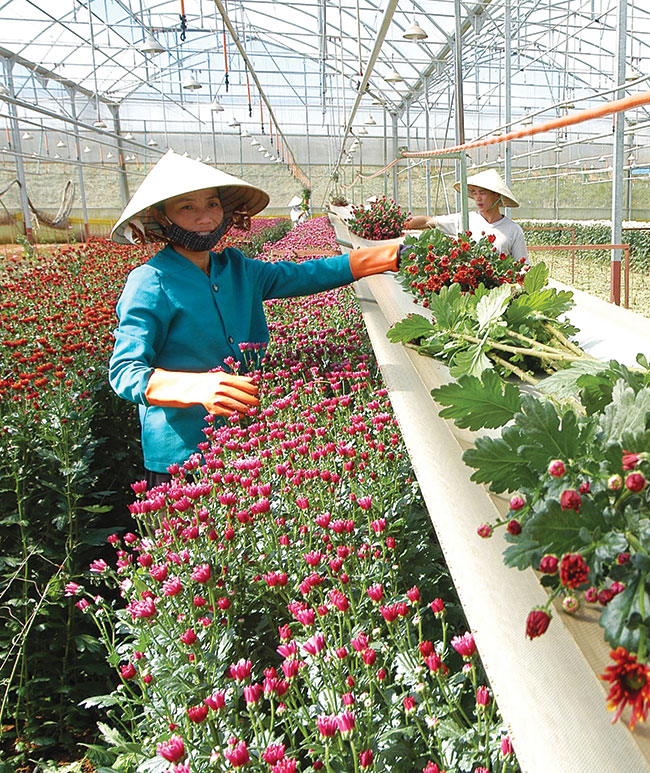Farming foreign agri-investments

Vietnam’s agriculture sector has proven to be fertile ground for foreign investment Photo: Le Toan
Dao The Anh, deputy director of the Field Crops Research Institute (FCRI) at the Vietnam Academy of Agricultural Sciences, said that a number of US and Japanese investors have recently asked them to act as bridge to help deploy speciality vegetable and rice projects in Vietnam for export back to these markets.
Scores of foreign investors have come to Vietnam in recent years in search of investment and cooperation opportunities in agriculture, with a large number hailing from Japan. This trend has increased sharply ahead of the free trade agreements (FTAs) between Vietnam and other countries.
In April this year, Japanese group Showa Denko spent $1 million to build a factory that produces pesticide-free vegetables in the northern province of Ha Nam. The factory will adopt a modern cultivation system that uses LED lighting instead of sunlight, a technique which increases the productivity rate by 250 per cent, compared to vegetable grown outdoors in natural light. Showa Denko already operates 21 factories of this kind in Japan.
Earlier this year, the large-scale egg producer ISE Food (also from Japan) came to Ho Chi Minh City seeking Vietnamese partners with which to share information and technology. Specifically, the firm was looking for local farmers to set up a chicken farm for the production of eggs, and to help introduce them to the local market.
Lam Dong province in Vietnam’s Central Region – home to the popular tourist destination of Dalat City – has also drawn great attention from Japanese businesses. The province is home to more than 100 direct foreign investment projects, over 60 per cent of which are involved in agriculture. The Japan International Co-operation Agency (JICA) is currently supporting the province in setting up an agricultural production cluster.
According to JICA Office deputy representative Yamamoto Kenichi, the idea has been welcomed by many Japanese investors, and JICA wants to help Lam Dong form a flagship agricultural production cluster for export to Japan.
The recently-signed FTA between Vietnam and South Korea is also expected to attract a wave of Korean investors into Vietnam’s agriculture sector.
The Korea Rural Community and Agriculture Corporation (KRC), a state-run firm from South Korea, has been investing in Vietnam’s Mekong Delta province of Dong Thap.
In a recent interview with VIR, KRC leaders said they were aiming for many more private Korean firms to set up shop in Vietnam under co-operative chain models.
According to the Foreign Investment Agency under the Ministry of Planning and Investment, as of May 2015, Vietnam was home to 530 operating FDI projects in the agro-forestry-fisheries sector with a total committed capital of $3.7 billion, representing 2.9 per cent of the total number of projects, and 1.4 per cent of the country’s total investment capital.
Over the last number of years, the capital scope of an agricultural sector project has remained at a stable average of $7 million.
Despite the increase in FDI agro-projects over recent years, the results so far in 2015 have been modest. Only two new FDI projects have been registered in the agricultural sector, with an investment capital worth $430,000.
In a bid to create a breakthrough in this field, the Ministry of Agriculture and Rural Development (MARD) has been tasked with penning a project on stepping up efforts to attract and manage FDI into the agro-forestry-fisheries sector during the 2015-2020 period, with a vision towards 2030.
MARD has sought comments on the project from relevant stakeholders for over a year, but the project has yet to be submitted to the government for consideration.
The national target for FDI into agriculture has been set at $4.5 billion by 2020, and increasing to $6 billion by 2030.
The proportion of agricultural sector FDI out of total FDI capital for the economy is hoped to climb to 4-5 per cent after 2020 against the current 1.4 per cent.
What the stars mean:
★ Poor ★ ★ Promising ★★★ Good ★★★★ Very good ★★★★★ Exceptional
Latest News
More News
- Site clearance work launched for Dung Quat refinery upgrade (February 04, 2026 | 18:06)
- Masan High-Tech Materials reports profit: a view from Nui Phao mine (February 04, 2026 | 16:13)
- Hermes joins Long Thanh cargo terminal development (February 04, 2026 | 15:59)
- SCG enhances production and distribution in Vietnam (February 04, 2026 | 08:00)
- UNIVACCO strengthens Asia expansion with Vietnam facility (February 03, 2026 | 08:00)
- Cai Mep Ha Port project wins approval with $1.95bn investment (February 02, 2026 | 16:17)
- Repositioning Vietnam in Asia’s manufacturing race (February 02, 2026 | 16:00)
- Manufacturing growth remains solid in early 2026 (February 02, 2026 | 15:28)
- Navigating venture capital trends across the continent (February 02, 2026 | 14:00)
- Motivations to achieve high growth (February 02, 2026 | 11:00)
















 Mobile Version
Mobile Version